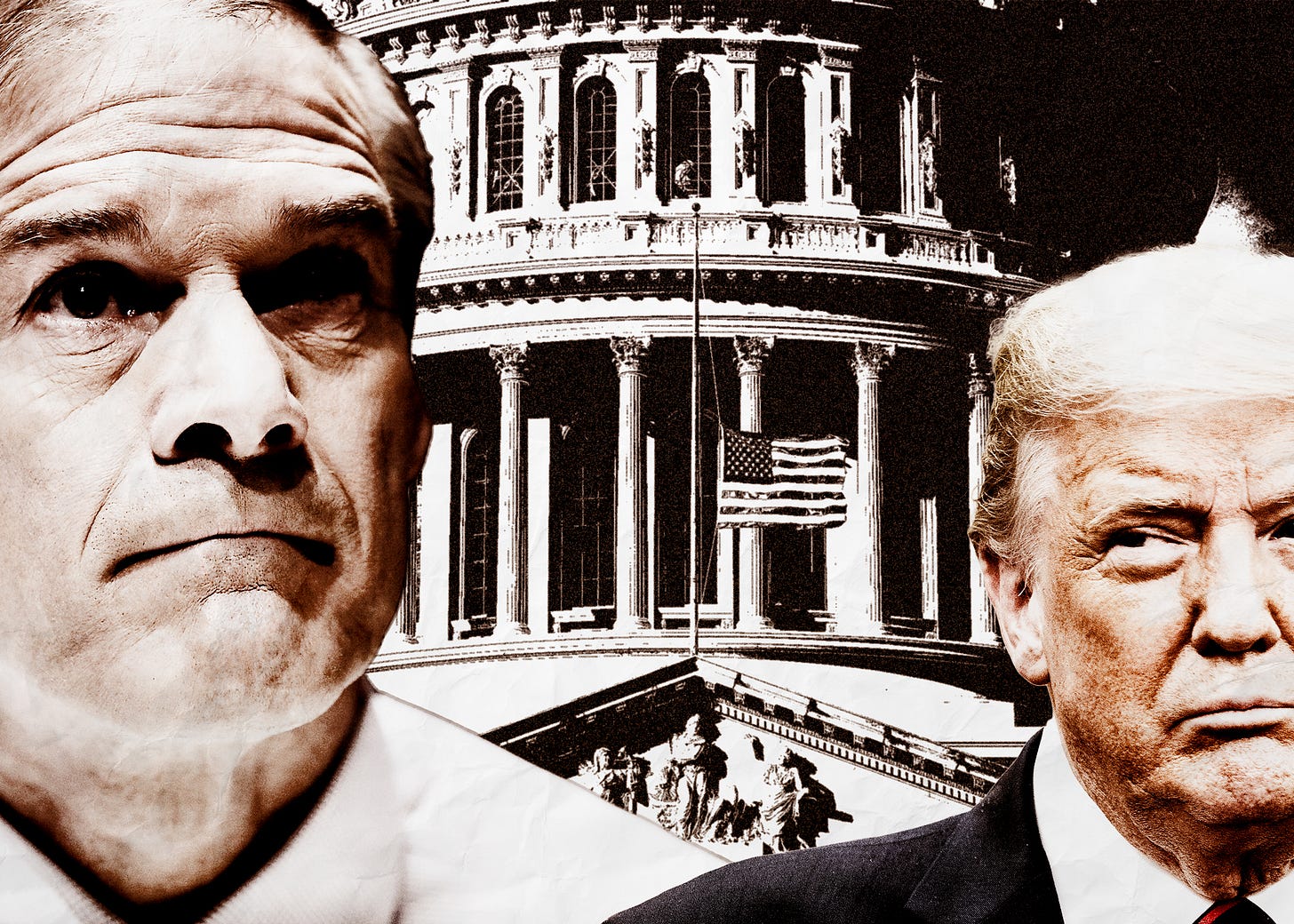Trump’s Aura of Invincibility Has Been Pierced
In rejecting Jim Jordan, House Republicans rejected Trump’s stated wishes and didn’t cave to high-pressure MAGA tactics.
JIM JORDAN’S DEFEAT IS THE FIRST REAL SIGN we’ve had of Donald Trump’s weakness. And it’s not clear that anyone realizes this fact.
Go back to 2016: As Trump steamrolled through the primaries, elected Republicans’ fear of retribution against those opposing him took on a mythical air. Somewhere along the path of vanquishing Low-Energy Jeb, Little Marco, and Lyin’ Ted, Trump’s inevitability as the future of Republicanism became invincibility against Republican resistance.
This aura helped him smash, demean, and humiliate all Republican opponents until they either bent the knee or left politics. Despite setbacks in the elections of 2018, 2020 and 2022, this discipline defined the GOP under Trump, elevating and preserving Trumpism as the new Republican establishment. Fealty to Trump replaced ideological orthodoxy as the glue of modern Republicanism.
But now, all of a sudden, that glue has stopped working.
Last week, Jim Jordan and the MAGA hordes used social media pressure, intimidation tactics, death threats, and even Sean Hannity in an attempt to force recalcitrant Republican members to make Jordan the speaker of the House. And for the first time since Trump became the leader of the party, this heavy-handed approach failed—spectacularly.
What we have seen since has provided us the first glimpse of what the GOP will look like in the post-Trump era.
TO BE CLEAR: We are not in the post-Trump era.
Trump himself holds a strong majority of the Republican electorate. But until last week’s debacle, Trump’s hold on the elected class in the House of Representatives was just as firm.
Not anymore. When the House Republican Conference voted by secret ballot, Jordan was crushed, losing 86 to 112.
This lopsided margin signaled that Jordan was finished—future rounds of floor voting would have gotten worse for him, not better. It also meant that there remain many Republicans still too cowardly to publicly state what they privately believe: that Trump and his allies are a danger to the country and a cancer in the party.
The bigger takeaway, though, was that the tactics employed by anti-Jordan forces in the conference were smart, deliberate, and coordinated.
The slow bleed of Jordan’s support round by round was designed not only to reveal the collapsing support for the Trump-backed candidate, but to signal that MAGA world’s brute-force attacks would be ineffective this time. Death threats were made public. Threatening phone calls were leaked to the media. Defiant Republicans issued press releases stating they would not be bullied or threatened. Jordan himself had to call off the hounds in a tweet decrying the attacks.
If only for a moment, the formerly establishment Republicans became the rebels and they turned the MAGA movement impotent and incapable of choosing one of their own to lead.
And now that the veil has been pulled back, the dynamics of the party have changed.
AGAIN: TRUMPISM HASN’T BEEN VANQUISHED in the party. But we now know that it can be beaten back—at least when it is divorced from the person of Donald Trump.
It turns out that the central weakness for a cult of personality is that the façade crumbles when that personality exits the stage. And this weakness exists by design. After all, Trump does not want there to be another leader who can rally his foot soldiers, no Trump-lite who can carry his mantle for him.
Not Ron DeSantis, who literally tries to emulate Trump’s cadence and hand gestures. Not Josh Hawley or Ted Cruz, who have dumbed down their Ivy League pedigrees in an attempt to pass as populists. Not Jim Jordan, who is arguably Trump’s closest ally in the House. Not even Trump’s children can replicate his dark magic.
Because Trump’s personality cult eroded the ideological framework of the GOP the party was turned into a performative spectacle, where differences are based on personality rather than policy. And a party based on personalities is impossible to lead when the Dear Leader is not at the top of the card.
Which is why Kevin McCarthy lost the speakership because of personal animosity, which then led to the party choosing between Steve Scalise, the last remnant of the establishment, and Jim Jordan, the heir to Trumpism in the House.
Neither of them came particularly close to winning a majority. The defeat of both then atomized the House conference into nine announced candidates speakership over the weekend, with very little policy difference between any of them. And even though we have a number of domestic and international crises around which Republicans could theoretically rally, they can’t manage it. Because those crises demand responses based on policy and the party has nothing at its center other than a single dominant personality.
The public repudiation of Jim Jordan was a unique moment. Trump entered the speakership fight knowing there was a genuine leadership vacuum and seeking to fill it with his preferred champion. But because he was not on the ballot himself, he could not assert his will.
Jordan’s defeat is a sign that, once Trump is gone from the scene, his remaining forces can be beaten within the party structure.




